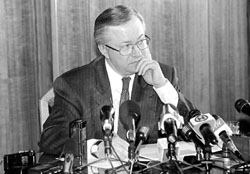Tarasiuk Battles EU Big Three

In conformity with President Kuchma’s decision, former Foreign Minister Borys Tarasiuk will run for the post of OSCE ethnic minorities high commissioner late this month. The post is being currently held by Max van der Stool, a person widely known in the former Soviet Union.
Mr. Tarasiuk’s rivals are also well known — Jose Kutileiro (Portugal), former General Secretary of the former West European Union, Daniel Tarschys, former Couincil of Europe General Secretary, Alain Destexhe (Belgium), First Deputy Head of the Senate’s international relations committee. The chances of contenders are not viewed as equal also due to their different weight categories and the present situation in Europe. Against the backdrop of all this, Mr. Tarasiuk’s chances do not look all that bad.
Mr. Tarasiuk seems to be in a better position today, as his rivals represent the European Union member countries but not the EU as a whole. There is no candidate so far who would suit all 15 member countries of the EU, while the probability that two of the three contenders will step down in favor of the third is slim. Given this, Mr. Tarasiuk could well serve as a compromise candidate. The more so that Mr. Tarasiuk has the backing of the CIS states.
Even if a single candidate would emerge from the EU trio, this will hardly put Mr. Tarasiuk off balance, officials in Kyiv believe, for he is a hardened fighter who managed to win battles invisible to the naked eye. But he has also had his share of defeats.
The rule of consensus, a common practice with the OSCE, is considered by Ukrainian diplomats to be a major hurdle for Mr. Tarasiuk to clear his way to becoming a high international official. There might be some objections, incidentally, not necessarily from the Russians, The Day was told by representatives of diplomatic circles. Moscow has no visible reasons to oppose Mr. Tarasiuk’s bid. On the other hand, no one could be certain that, say, a representative of Luxembourg or any other EU member country might take a different view of the whole situation.
There is no telling how Slovakia, Ukraine’s latest rival for a non-permanent membership on the UN Security Council, might vote. No one would dare predict what kind of instructions a representative of Belarus might get on the eve of the vote. And so on. The argument definitely favoring Mr. Tarasiuk is that he knows perfectly well what kind of problems an OSCE high commissioner has to deal with. Another feather in Mr. Tarasiuk’s cap is that throughout his diplomatic career as deputy foreign minister, Ukraine’s ambassador to Brussels, and foreign minister he has enjoyed the respect of his colleagues as a skillful negotiator of deadlocked conflicts able to score results which at first glance seemed utterly utopian.
No one seems to believe that Mr. Tarasiuk’s career is over and his ambitions are destined to be foiled. On the other hand, his comeback to Ukrainian diplomacy in the immediate future is considered unlikely. His election to the office of the OSCE high commissioner could become a springboard for the former minister on his way to greater international recognition and might somewhat enhance Ukraine’s image in the world.






